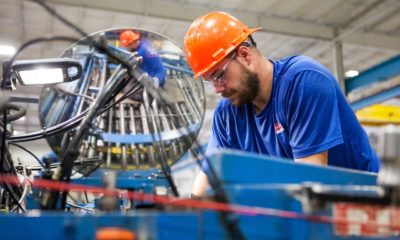Business
The role of the internet of things in changing the face of the manufacturing industry
The Internet of Things (IoT) has reshaped retail and commerce, with the manufacturing industry using innovative ways of producing goods.

The internet of things is an innovative and advanced technology, which has undoubtedly changed the facets of various industries. From healthcare to agriculture to retail to transportation, the internet of things contributes to making things run smoother.
We have probably seen a massive transformation in the manufacturing sector, which has given birth to Industrial Internet of Things (IIoT). This means the manufacturing industry has been digitally revolutionized and that the machines have become smarter with embedded sensors, switches, and intelligent controlling systems.
The manufacturers are quick to embrace this space-age technology, which is helping them to gather vital data from the sensors. The IIoT has proved its worth, enabling access to latest insights of the manufacturing industry to enhance the production and efficiency. In addition, they can also keep a track record of stock of finished goods, raw materials and packaging, etc., to offer optimum quality assurance. And what’s more interesting is you can gather all these information in real time.
One of the major players in the manufacturing sector is Industry 4.0. It can be defined as the latest trend of automation and data exchange that, along with the internet of things, make the factories smarter.
Since IoT is a virtually connected internet connection, the data can be harnessed from machines to be processed and utilized further. The Industrial 4.0 also involves cyber-physical systems and cloud computing apart from the internet of things. Indeed, it is being seen as the Fourth Industrial Revolution.
According to the latest reports, the manufacturing operations made an internet of things expenditure of about $102.5 billion, out of the total $178 billion. In fact, Business Insider has predicted that the number of connected machines in manufacturing arena will increase to 923 million by 2020. There is no doubt that more and more factories will eagerly implement the industrial internet of things solutions in the future.
Effectively managing the manufacturing operations
When we talk about manufacturing operations, we have to take into consideration the various elements that involve employing intelligent and advanced techniques for manufacturing goods, better management of machinery and assets, the smart interaction between human and machine, and much more.
The manufacturer can take quick and apt business decisions and also frame an appropriate strategy after getting familiar with the entire view of operations. In fact, all these procedures are connected to Industrial 4.0, which is the blend of the internet of things and Cyber-Physical Systems.
The IoT also enables the manufacturing plant to work efficiently and smartly by allowing a quick access to analyze data. In addition, it can bring more transparency in production with the help of visualization tools. This will also increase the productivity of the employees as the exchange of data will take place in real time, offering better communication opportunities. IoT also helps to prevent machine failure, thus evading any chances of a production delay.
Managing and maintaining manufacturing resources
It is important for the manufacturing units to keep an eye on the manufacturing resources such as the consumption of raw materials, etc. Apart from that, the maintenance is often regarded as a daunting task.
IoT has made this job simpler than before. It ensures best-in-class products and seamless operation of machinery. Because of this intelligent system, the manufacturers can detect the problem beforehand and get it repaired to prevent the snag.

The Internet of Things provides a seamless monitoring of inventory. (Source)
Preventing the industrial accidents and strengthening safety
Of late, the manufacturing industry and factories have been focusing a lot more on providing topmost security to their employees and workers. The internet of things is such a boon that it can help a great deal in preventing the fatal industrial accidents.
It comprises of highly advanced sensors and connected devices that provide an early warning to the workers if there is any defect in the system. At times, the workers may not be aware of the hazardous situation, especially when they are working in extremely tough conditions such as mining.
One can cite the example of Austria in this regard, where the employees of a construction unit use the smart helmets to monitor the body temperature, the heartbeat and other parameters to prevent them from heat stroke. The internet of things alerts the concerned authorities even before the symptom begins, and they immediately take the necessary precaution.
Reducing the cost of manufacturing
We have already seen that internet of things has been highly effective in asset management and monitoring the routine maintenance plan as well as preventing machine failure. Most of the manufacturers look to reduce the cost of production and increasing profits. However, if you also want to ride the same boat, then it is crucial to adopt these steps:
– The first is rapid costing in which the manufacturer is required to collect important data information such as hi-rates, consumer preferences, footprint requirements, records of past productions, etc., to combine with IIoT strategy.
– Collecting data on non-conforming reports, which is issued when the product is not up to the standard. The NCR reports will reduce production flaws. The role of the internet of things here is analyzing the NCR data properly and helping to reduce further such incidents.
– You can also take the help of IIoT in optimizing the strategy for plant load optimization. The IoT can assist in sales and operational planning, which not only allows to run the business but control the business strategies. The internet of things is also important to balance the trade-offs.
– The low-cost and reliable sensors connected with the machines will also play a vital role in cost cutting production. The internet of things will make the machines highly advanced where it can detect the problem on its own and repair themselves.
– The IIoT will also be useful in providing valuable insight to the manufacturer on supply chain and the suppliers. They can access it in real time. The devices, once connected to the IoT, will make it easier for parties to trace inter-dependencies and material flow, etc.
Setting-up machinery will be easier
The internet of things will give a room or a flexible scope to the manufacturing sector to set up or install the machines easily. In fact, the machines can even be configured and controlled from a centralized location. Earlier, it was one of the most hectic and time-consuming tasks. This will again reduce the cost of labor.
Innovating field operations
The field service is an important junction for the manufacturing sector where it offers product-related and business-related services. The connection with IoT devices helps to provide proactive services and also plan the schedules in order to reach out more and more customers.
Other areas where the internet of things will benefit the manufacturing industry
– The manufacturing industry will launch autonomous vehicles by the end of this year. These are driverless cars that will operate on technology related to the internet of things and artificial intelligence.
– The manufacturers will be able to track their own assets with the help of IIoT-connected devices and thus establish the connection with retailers and wholesalers.
– The IIoT will also prove beneficial in inventory management as manufacturers will be able to control the inventory levels and customize demands.
– If the situation demands, the manufacturers can make the changes in real-time and also manage the warehouse better with the internet of things.
The internet of things is ready to take the world to the next level where the technology will exceed beyond any imagination. We are already witnessing that the electronic appliances manufactured today are enabled with Wi-Fi connectivity.
The manufacturing industry is taking comprehensive advantage of the IIoT and Industry 4.0 to plan business strategies, manage and maintain the operations and asset utilization, and reduce the manufacturing cost. The IIoT is making the industries smarter and self-reliable.
—
DISCLAIMER: This article expresses my own ideas and opinions. Any information I have shared are from sources that I believe to be reliable and accurate. I did not receive any financial compensation in writing this post, nor do I own any shares in any company I’ve mentioned. I encourage any reader to do their own diligent research first before making any investment decisions.

-

 Crowdfunding2 weeks ago
Crowdfunding2 weeks agoAWOL Vision’s Aetherion Projectors Raise Millions on Kickstarter
-

 Africa2 days ago
Africa2 days agoFrance and Morocco Sign Agreements to Boost Business Mobility and Investment
-

 Impact Investing1 week ago
Impact Investing1 week agoItaly’s Listed Companies Reach Strong ESG Compliance, Led by Banks and Utilities
-

 Impact Investing6 days ago
Impact Investing6 days agoCDP Approves €1.5 Billion Package to Boost Industry, Renewables, and International Development

























You must be logged in to post a comment Login